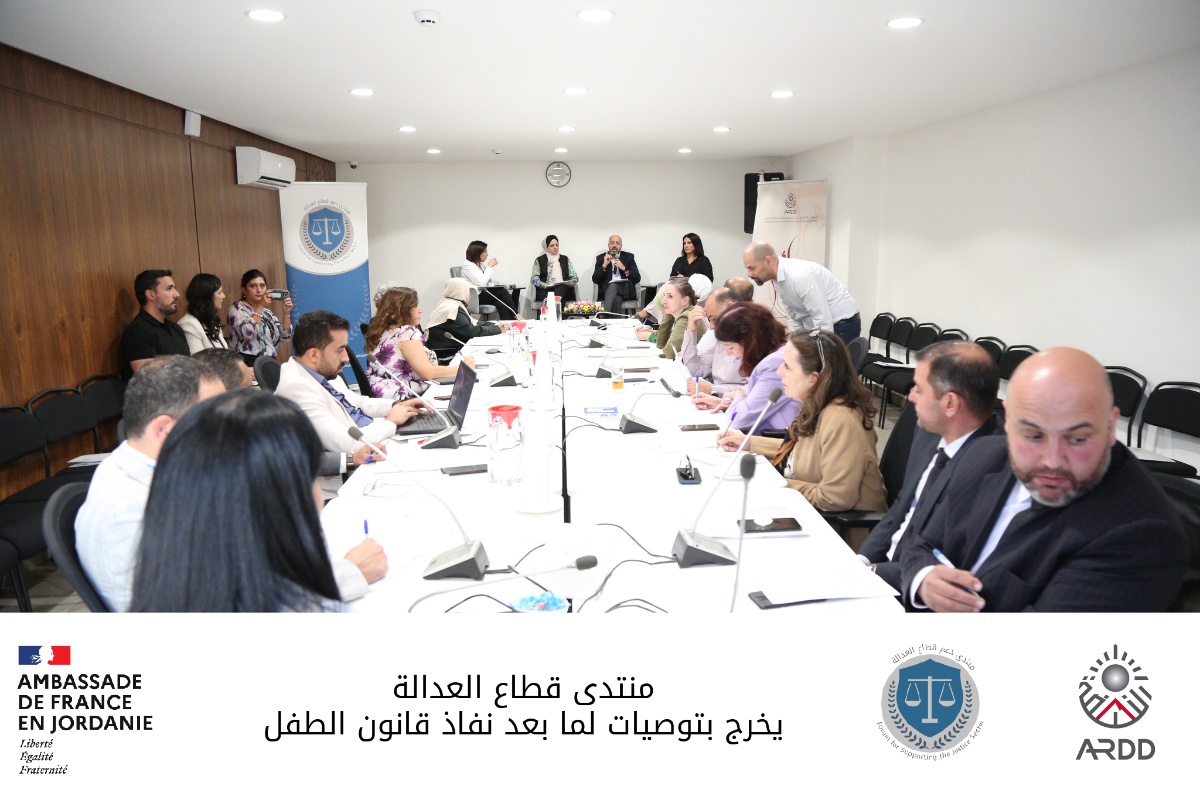Since its adoption last April, the Child’s Rights Law has elicited tremendous controversy and discussions. The bill was passed by the Senate and entered into effect 90 days after its promulgation. Proponents of the law believe it was contextualized and protects children’s rights, while opponents see it as having been imported from the West, reinforcing individualism, and contradicting Sharia and the values of the Jordanian society.
In line with of its undertakings in the justice sector, and its role in upholding the rule of law and comprehensive social protection, and as part of the Strengthening the Public Trust in the Justice Sector Through Social Dialogue project funded by the French Embassy in Jordan, the Arab Renaissance for Democracy and Development’s (ARDD) Forum for Supporting the Justice Sector held a discussion session titled “Children’s Rights Bill, What Next?” with the aim of examining legislative procedures, amendments, and requirements relevant to the bill and the role of civil society and official health, educational, developmental, and legal institutions in implementing the law.
Secretary General of the National Council of Family Affairs Dr Mohammad Miqdadi, Legal Advisor and former president of the Legislation and Opinion Bureau Fida Hmoud, and Executive Director of the Justice Center for Legal Aid Hadeel Abdulaziz took part in the session.
Media and Communications Manager at Save the Children Jordan Nadine Nimri moderated the session. She said that the children’s rights bill, which came 24 years after the original documents were drafted, stirred tremendous controversy in the Parliament and on social media, stressing that although the law did not meet the expectations, since “it goes into effect at the beginning of next year, we need to accept it has become a reality”.
According to Miqdadi, the law is a translation of the Convention on the Rights of the Child signed by Jordan in 2006. The National Council for Family Affairs began drafting the law in 2015 and presented it to the government in 2019. Throughout these years, the council was in constant dialogue with the Legislation and Opinion Bureau and Jordanian institutions for recommendations and comments on the bill to ensure its pertinence”, he said, adding that the rationale for the law was the desire to emphasize children’s rights to healthcare and education.
Speaking about the advantages of the law, Miqdadi said that the law focuses on improving the declining quality of public education, especially since the pandemic. For example, he said, the Ministry of Education by-law make no mention of “school dropouts”, but the bill clearly states that it is prohibited for children to drop out of school, which most often leads to homelessness and child labor. The bill also enforces primary healthcare for children, he said, and advocates for a rehabilitation center for minors using drugs. The right to primary healthcare for all children in Jordan will be completely achieved within 10 years, he said, stressing that the bill is the best product under the circumstances and available resources, and that it is time bound.
Hmoud stressed the need to revise the law and attempt to explain it clearly to the population to avoid misinterpretation. She said the law should take precedence over all other related laws, but that the Parliament’s amendment stresses “unless in conflict with regulations”, which allow previous laws to prevail. Hmoud also denounced the amendment concerning guardianship, which diminish mothers’ importance or authority. The amendment gives a child’s male guardian authority, especially in regard to the child’s education, she said, stressing that “the law is full of legislative contradictions and flaws and some texts are prone to different interpretations”.
AbdulAziz refuted accusations that the law contradicts Sharia. She said that the amendments concerning Article 4 of the bill make it read “ensuring the child’s enjoyment of all rights stated in this law as long as they do not contradict with the public system, religious and social values, and other relevant regulations, and [is] in line with ensuring the family’s legitimate form and function as the base of a community built on religion, ethics, and the love of the country.” The amendment, thus, dashed any hope that the law would address the flaws in other laws and act as a constitution for children’s rights, she said, adding that it “took us back where we started”. “Since we passed a law to protect children from violence, we should now aim at amending Article 63 of the Penal Code that allows parents to ‘discipline’ their children without clarifying the methods to prevent extreme measures.
President of the Anti-Narcotics Department Dr Osama Manaa’sa tackled the issue of rehabilitation centers, saying that “the architectural plans for women and minors’ rehabilitation center are ready and construction will begin in the coming weeks. The center will cost JD2 million, allocated by the Anti-Narcotics Department budget.”
ARDD CEO Samar Muhareb spoke about the importance of raising awareness about the law and stressed the importance of collaboration between media and civil society. She said that civil society representatives were not involved in the process of formulating the law, “for various reasons, but it is now time to unite efforts and prepare for the future.” She also reiterated the common goal of the society, which is to offer the best protection possible to children.
Participants in the session issued the following recommendations:
– Improve networking among actors involved in the protection, health, and care of children, and the implementation of the law.
– Conduct studies about the challenges facing children and service providers.
– Review laws pertaining to children directly or indirectly.
– Launch advocacy campaigns to push for expedited regulations relevant to the law.
– Design and develop programs and policies to raise awareness and ensure proper guidance.
– Establish rehabilitation centers for children.
– Start implementing the law fully.
– Familiarize the population with the law through civil society representatives’ visits to villages in towns in all governorates.
– Ensure the protection and best interests of children.


